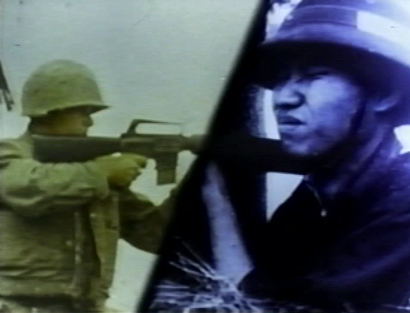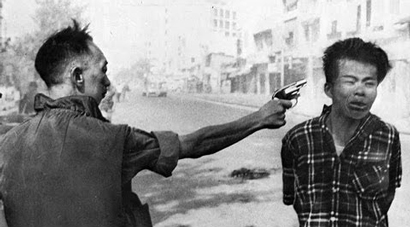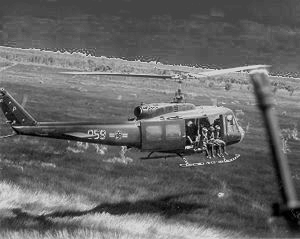
 |
|
|
|
The big lesson to be gleaned from the Canadian documentary miniseries Vietnam: The Ten Thousand Day War is that wars, even victorious ones, lead inexorably to more wars. The Allies scored an undeniable moral victory in World War 2. But as soon as Japan was defeated the winners rushed in to reclaim colonial territories. In more than a few cases they reneged on self-determination pacts made with the peoples that had helped them defeat the Axis. Vietnam wanted no more French exploitation, which encouraged an independence movement under a Communist leader, Ho Chi Minh. France wouldn't budge. As soon as fighting in Korea sputtered to a costly, unresolved standstill, Vietnam became the next major battlefield to hold back the Red threat. 
The history of America's involvement in Vietnam is by turns understandable, frustrating, and deplorable -- a quicksand of good intentions and criminal ignorance. The issue was so divisive and thorny that popular entertainment by and large ignored it. The only major studio film about the conflict made during the fighting may have been John Wayne's gung-ho war adventure. We Americans experienced the war through grim nightly news stories, and upbeat Bob Hope battlefront tour TV specials. American society was uninformed about the larger tragedies created by the conflict, and for that matter surely didn't care. Unless you had a loved one in the fighting, the immediacy of Vietnam remained at arm's length. The series writer for Vietnam: The Ten Thousand Day War is war correspondent Peter Arnett, known best for his work at CNN. His combat coverage was critical enough for both General Westmoreland and President Johnson to try to have him pulled from reporting duty. Canadian-based independent producer Michael Maclear also had decades of war reporting behind him, including work in Vietnam. Perhaps inspired by the English docu series The World At War, Maclear proposed a similar comprehensive multi-part historical TV series, to include interviews with key figures on either side. Maclear and Arnett obtained on-camera input from just about every available major player in the long and painful story of the war: North and South Vietnamese diplomats, French representatives, other correspondents. The long list of high-ranking American players include Secretaries of Defense Clark Clifford & Melvin Laird, Secretary of State Dean Rusk, Ambassador Henry Cabot Lodge, CIA Director William Colby, Nixon's Chief of Staff Alexander Haig, Kennedy Advisor Arthur Schlesinger Jr., and General William Westmoreland. And then there are the dissidents: Daniel Ellsberg and Jerry Rubin. Archive and news footage fills in every conceivable gap. The show also includes a number of unique interviews with North Vietnamese politicians and generals, all of whom remained largely unknown to America, even during the war. Maclear was the first accredited Western journalist granted access to Vietnam after the fighting. His good relationship explains the show's large volume of rare Vietnamese archive film. 
The miniseries made its debut in Canada in 1980 but was not shown in the U.K. until 1984. The first episode is an overview of the entire thirty-year arc of the war. Succeeding installments advance us chapter by painful chapter through the French years that ended with the defeat at Dien Bien Phu, the years of puppet South Vietnamese governments and American indecision, and the awful escalation of the war as handed from Eisenhower to Kennedy to Johnson and finally to Nixon. The format moves fast, distilling events through judicious use of interview material. Some 30-minute episodes will revive painful memories for anybody who lived through this period. We were shocked by TV news film of a man burning himself alive, as part of a protest. I remember my mother asking why anybody would allow such a ghastly thing to be shown at all. As an eleven year-old, I could not believe that a man would do this for any reason. Not until seeing this miniseries in the 1980s did I realize that the Buddhist monks killed themselves in protest to the puppet South Vietnamese regime. 1 The Ten Thousand Day War makes very clear how such a tiny country could withstand the military might of the United States. The North may not have been a democracy, but unlike the South it cannot be described as a puppet state directed from without. All the Chinese and Russian aid would have accounted for nothing had the North Vietnamese people not shown such solidarity and resolve. The entire population mobilized for two clear objectives: to resist the invader and to reunite the country. Thousands labored to build roads to haul artillery pieces through the jungle. An entire society lived underground for a decade to survive Johnson and Nixon's punitive bombing. You can't defeat a people like that. Sobering episodes detail the weaponry used against the North Vietnamese, a massive overkill agenda that fails miserably. Another show explains the significant impact made by the anti-war movement back home. We hear the hard facts behind the Tet Offensive and the sledgehammer diplomacy used by Kissinger, along with Nixon's "Peace - With Honor" sales job to an American people that re-elected him in the most dramatic landslide of the 20th century. 
It needs to be stressed that Vietnam: The Ten Thousand Day War is not an advocacy piece like Peter Davis's anti-war Hearts and Minds. It shows U.S. soldiers visiting prostitutes in Hanoi, and has the courage to show General Westmoreland making a racist joke about the Army's "winning hearts and minds" slogan. Hearts and Minds was meant to confront Americans with the unpopular, undiluted truth. Michael Maclear's more rounded picture was designed for TV distribution; its comprehensive overview lessens the need for editorializing. A French veteran of Dien Bien Phu comes off as a blowhard wallowing in a 19th-century veneer of military honor. But the miniseries also gives full voice to the sincere American diplomats and strategists trying to make sense of their assignments. The accumulation of damning facts soon takes its toll. We see the tragic film and still images most closely associated with the war, in their original context. Democrats escalated the war, to the point that LBJ becomes a tragic figure himself. In this mire of delusion and untruth, somebody like Daniel Ellsberg comes off as a genuine hero of conscience. Vietnam: The Ten Thousand Day War is an invaluable historical resource and engrossing documentary entertainment. Its key-source, original-film content peels away the fantasies engendered by decades of movie impressions. The miniseries certainly refreshed my memory -- some of the lessons of Vietnam seem to have been learned in later 'elective' wars, and others definitely not. Star Vista / Time Life / VSC's DVD set of Vietnam: The Ten Thousand Day War contains 26 original episodes on four discs. The bit rate is more than adequate, and color and contrast are very good, especially considering the wide variance in source quality. The (originally 16mm?) image is quite stable, although the show's color title logo rides in the frame for some reason. The North Vietnamese material is of course all in B&W and some of it is in marginal shape; the show probably contains every known piece of film footage of Ho Chi Minh. The discs have simple menus and the graphics and map inserts are said to have been improved. We did notice a slight repetition of footage now and then. Many of the episodes overlap slightly in content. A scene of a daylight jungle patrol ("Drop back about five meters...") is seen at least three times. Yet for overall clarity, this is a beautifully edited show. It doesn't strain for as many ironic effects as the classic The World at War.
On a scale of Excellent, Good, Fair, and Poor,
Vietnam: The Ten Thousand Day War rates:
Footnotes:
1. The vile Madam Nhu's response to the self-immolating monks was to make sick jokes about "Buddhists holding a barbecue". Other pundits claimed that the suicides had been directed by the Communists. Rubbish. For future reference: do you think you believe in ANYTHING strongly enough to light yourself aflame, sit calmly and burn like a human torch? The monks are a lesson in absolute sincerity. If a man kills himself that way, any reason he decides to give for why he did it, any reason at all, is the truth.
Reviews on the Savant main site have additional credits information and are often updated and annotated with footnotes, reader input and graphics.
Review Staff | About DVD Talk | Newsletter Subscribe | Join DVD Talk Forum |
| ||||||||||||||||||